Honda Jazz VS Toyota Yaris Cross
In this head-to-head comparison, the Honda Jazz showcases its practicality and spacious interior, making it an excellent choice for urban drivers who prioritize versatility. On the other hand, the Toyota Yaris Cross impresses with its stylish SUV design and off-road capability, appealing to those seeking a more adventurous ride. Both models offer advanced tech features and fuel efficiency, but your choice will ultimately depend on whether you value compact convenience or a sporty crossover experience.
Honda Jazz
The Honda Jazz stands out in the compact car category with its intelligently designed interior, offering a surprisingly spacious cabin that comfortably accommodates passengers and luggage. Its efficient hybrid powertrain ensures a smooth and economical driving experience, ideal for both urban commutes and longer journeys. Furthermore, the Jazz is equipped with a range of advanced safety features, providing peace of mind while on the road.
detailsToyota Yaris Cross
The Toyota Yaris Cross combines the practicality of a compact SUV with the agility of a smaller car, making it ideal for urban adventures. Its elevated seating position offers excellent visibility, while the stylish design ensures it stands out on the city streets. Inside, the Yaris Cross boasts a modern interior with advanced technology features designed to enhance the driving experience.
detailsIntroduction: The Battle of Hybrids
In the ever-evolving world of compact vehicles, few comparisons ignite the passion of automotive enthusiasts like that of the Honda Jazz and the Toyota Yaris Cross. Both models showcase remarkable engineering, innovative technology, and practicality, but they each cater to different segments of the market. This article dives deep into the specifications, innovations, and overall performance of these two hybrid contenders to help you decide which one may be the perfect fit for you.
Design and Dimensions
The Honda Jazz stands out as a hatchback with a compact design ideal for urban environments. Measuring between 4089mm and 4105mm in length and a height of 1526mm to 1556mm, it boasts a spacious interior despite its small footprint. In contrast, the Toyota Yaris Cross takes a more robust approach as a compact SUV, measuring 4180mm in length and 1595mm in height, giving it a commanding presence on the road.
Despite these differences, both vehicles feature five doors and ample space for five passengers. The trunk capacity of the Yaris Cross ranges from 320 to 397 liters, surpassing the Jazz's trunk capacity of 304 liters, making it a more suitable option for those needing extra cargo space.
Powertrain and Performance
Under the hood, both vehicles utilize a full hybrid engine, showcasing commitment to efficiency and sustainability. The Honda Jazz is powered by a 1498cm³ 4-cylinder engine that generates a respectable 122 HP and 253 Nm of torque. The Jazz accelerates from 0 to 100km/h in a swift 9.4 to 9.7 seconds and reaches a top speed of 175 km/h.
The Toyota Yaris Cross, on the other hand, is equipped with a slightly smaller 1490cm³ 3-cylinder engine offering two power outputs: 116 HP and 130 HP. Its acceleration from 0 to 100km/h ranges from 10.7 to 11.3 seconds, and its maximum speed is capped at 170 km/h. While the Yaris Cross may not match the Jazz's straight-line speed, it remains a competent performer in its own right.
Fuel Efficiency and Emissions
Fuel efficiency is a crucial factor in the hybrid segment, and both the Jazz and Yaris Cross perform admirably. The Honda Jazz boasts a fuel consumption ranging from 4.5 to 4.8 L/100km, and its CO2 emissions vary from 102 to 108 g/km, placing it in the C efficiency class. In comparison, the Yaris Cross claims slightly better fuel consumption figures at 4.5 to 4.8 L/100km and lower CO2 emissions ranging from 101 to 108 g/km.
Interior Features and Technology
When it comes to interior design and technology, both vehicles have their strengths. The Honda Jazz is renowned for its versatile Magic Seats, which allow for multiple configurations to maximize space and storage. Additionally, it is equipped with an intuitive infotainment system designed for seamless connectivity.
The Toyota Yaris Cross, on the other hand, boasts a more rugged interior that is practical for outdoor adventures and an array of advanced safety features. Its tech offerings include a modern touchscreen interface and various driver-assistance technologies that enhance safety and driving confidence.
Final Verdict: Choosing the Right Fit
In conclusion, both the Honda Jazz and Toyota Yaris Cross present strong cases for their respective categories. The Jazz excels in compactness, performance, and innovative interior features, making it perfect for city dwellers. Conversely, the Yaris Cross offers a robust SUV design, superior trunk space, and slightly better fuel efficiency. It is ideally suited for active lifestyles necessitating extra cargo capacity.
Ultimately, the choice between the Honda Jazz and Toyota Yaris Cross boils down to personal preference and lifestyle requirements. Whether you prioritize agility and innovative design or a spacious and rugged feel, there's no denying that both models represent the pinnacle of hybrid technology in their segments.
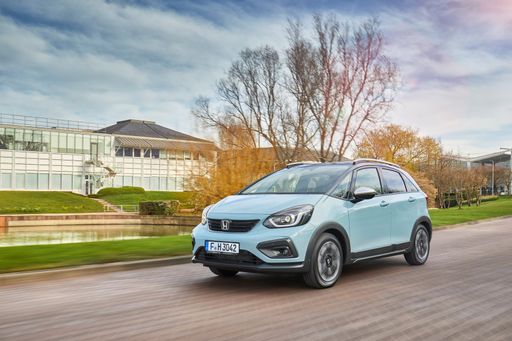 @ hondanews.eu
@ hondanews.eu
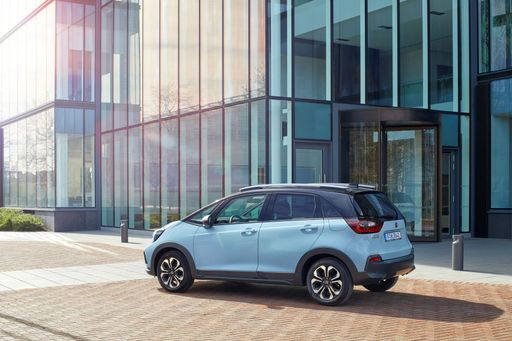 @ hondanews.eu
@ hondanews.eu
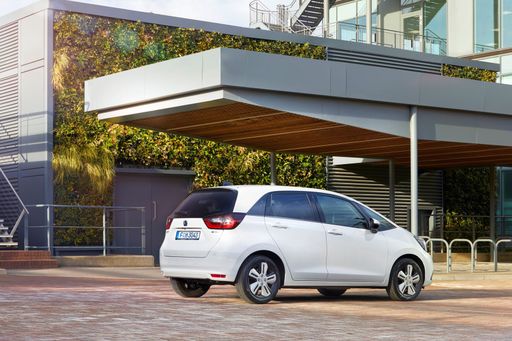 @ hondanews.eu
@ hondanews.eu
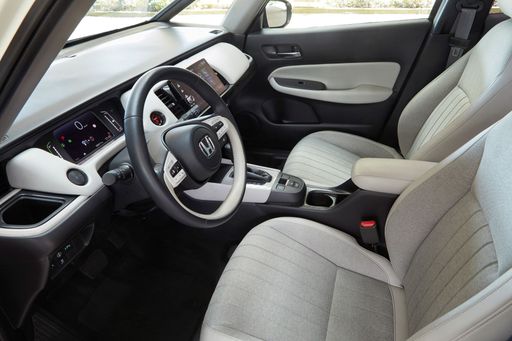 @ hondanews.eu
@ hondanews.eu
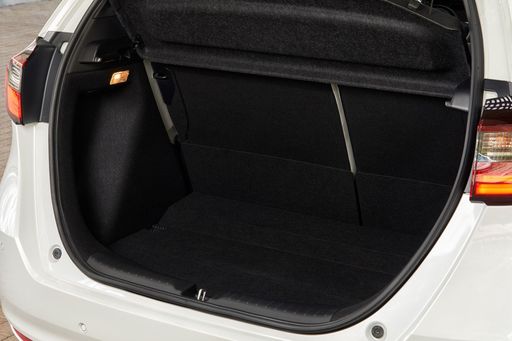 @ hondanews.eu
@ hondanews.eu
 @ Toyota
@ Toyota
 @ Toyota
@ Toyota
 @ Toyota
@ Toyota
 @ Toyota
@ Toyota
 @ Toyota
@ Toyota
 @ Toyota
@ Toyota
 @ Toyota
@ Toyota

|

|
|
|
|
Costs and Consumption |
|
|---|---|
|
Price
about 23100 - 26100
£
|
Price
about 24200 - 33900
£
|
|
Consumption L/100km
4.5 - 4.8
L
|
Consumption L/100km
4.5 - 4.8
L
|
|
Consumption kWh/100km
-
|
Consumption kWh/100km
-
|
|
Electric Range
-
|
Electric Range
-
|
|
Battery Capacity
-
|
Battery Capacity
-
|
|
co2
102 - 108
g/km
|
co2
101 - 108
g/km
|
|
Fuel tank capacity
40
L
|
Fuel tank capacity
36
L
|
Dimensions and Body |
|
|
Body Type
Hatchback
|
Body Type
SUV
|
|
Seats
5
|
Seats
5
|
|
Doors
5
|
Doors
5
|
|
Curb weight
1302 - 1320
kg
|
Curb weight
1180 - 1290
kg
|
|
Trunk capacity
304
L
|
Trunk capacity
320 - 397
L
|
|
Length
4089 - 4105
mm
|
Length
4180
mm
|
|
Width
-
|
Width
1765
mm
|
|
Height
1526 - 1556
mm
|
Height
1595
mm
|
|
Payload
370 - 388
kg
|
Payload
485 - 510
kg
|
Engine and Performance |
|
|
Engine Type
Full Hybrid
|
Engine Type
Full Hybrid
|
|
Transmission
Automatic
|
Transmission
Automatic
|
|
Transmission Detail
CVT
|
Transmission Detail
CVT
|
|
Drive Type
Front-Wheel Drive
|
Drive Type
Front-Wheel Drive
|
|
Power HP
122
HP
|
Power HP
116 - 130
HP
|
|
Acceleration 0-100km/h
9.4 - 9.7
s
|
Acceleration 0-100km/h
10.7 - 11.3
s
|
|
Max Speed
175
km/h
|
Max Speed
170
km/h
|
|
Torque
253
Nm
|
Torque
-
|
|
Number of Cylinders
4
|
Number of Cylinders
3
|
|
Power kW
90
kW
|
Power kW
85 - 96
kW
|
|
Engine capacity
1498
cm3
|
Engine capacity
1490
cm3
|
|
Top speed
175
km/h
|
Top speed
170
km/h
|
General |
|
|
Model Year
2023
|
Model Year
2024
|
|
CO2 Efficiency Class
C
|
CO2 Efficiency Class
C
|
|
Brand
Honda
|
Brand
Toyota
|
Honda Jazz
The Evolution of the Honda Jazz: A Modern Marvel in Compact Design
The Honda Jazz, known for its compact yet spacious design, continues to impress with its blend of practicality and innovation. Today, we delve into the technical details and innovations that make the latest models of the Honda Jazz stand out in the competitive auto market.
Hybrid Powertrain: Efficiency and Performance
The Honda Jazz is equipped with a cutting-edge 1.5 i-MMD e:HEV full hybrid engine, delivering an impressive 122 PS, or 90 kW. This powertrain seamlessly balances efficiency and performance, achieving a fuel consumption of 4.5 to 4.8 L/100km. Whether navigating the city streets or taking on longer journeys, the Jazz provides a responsive and smooth driving experience, accentuated by its CVT automatic transmission.
Sleek Design with Smart Storage Solutions
Staying true to its roots, the Honda Jazz maintains a compact exterior with dimensions ranging from 4089 to 4105 mm in length and 1526 to 1556 mm in height. Despite its size, the Jazz offers ample luggage capacity of 304 litres, thanks to the intelligent Magic Seat system that allows for flexible storage configurations. The combination of a sleek design with practical storage makes the Jazz an ideal city companion.
Advanced Technology and Comfort
The Honda Jazz doesn’t stop at efficiency; it also comes packed with a plethora of technological features. As part of its high-tech package, the Jazz includes a state-of-the-art infotainment system and various driving assistance technologies, enhancing both safety and comfort. Families and commuters alike will appreciate the thoughtfully designed interior, seating up to five passengers with ease.
Performance and Handling Dynamics
The driving experience of the Honda Jazz is primarily characterised by its lively handling and assured grip thanks to its front-wheel-drive configuration. With a torque of 253 Nm and a 0-100 km/h acceleration between 9.4 to 9.7 seconds, the Jazz offers adequate performance for everyday urban driving. The maximum speed reaches 175 km/h, ensuring the Jazz can hold its own on motorways too.
Environmental Responsibility and Cost Efficiency
In an era of heightened environmental awareness, the Honda Jazz stands out with a CO2 emission range of 102 to 108 g/km, adhering to the CO2 Efficiency Class C. Cost-conscious consumers will appreciate the Jazz's low running costs, with potential expenses ranging from €812 to €877 per month and a cost per kilometre of 32.5 to 35.1 cents.
Conclusion: A Comprehensive Package
Combining innovation, economy, and style, the Honda Jazz serves as a testament to Honda's commitment to evolving their compact range to meet the modern driver's needs. For those seeking a reliable, efficient, and technologically advanced vehicle, the Honda Jazz stands ready to elevate their driving experience.
Toyota Yaris Cross
Discovering the Toyota Yaris Cross: The Compact SUV Redefined
The Toyota Yaris Cross has boldly entered the compact SUV market, sporting a blend of sleek aesthetics, advanced hybrid technology, and practical functionality. As urban driving dynamics evolve, this vehicle meets the demands of modern motorists with an impressive performance and eco-friendly technology, setting itself apart in a bustling segment.
Performance and Efficiency: Hybrid Innovation at Its Best
The Yaris Cross is designed to provide an engaging driving experience combined with remarkable efficiency. At its heart lies a full hybrid powertrain, offering options between 116 PS and 130 PS, efficiently paired with Toyota's CVT automatic transmission. The hybrid system seamlessly integrates a petrol engine with an electric motor, optimising power delivery and responsiveness.
Drivers will appreciate the low fuel consumption, which ranges from 4.5 to 4.8 litres per 100 km, and equally impressive CO2 emissions of 101 to 108 g/km, aligning with the industry's ongoing commitment to sustainability.
Design and Dimensions: Compact Yet Spacious
The Yaris Cross offers a perfect blend of compact design and interior spaciousness, making it an ideal choice for urban environments. Measuring 4,180 mm in length, 1,765 mm in width, and 1,595 mm in height, the vehicle manages to provide a refined SUV stature without sacrificing manoeuvrability.
Its five-door layout and flexible boot space, ranging from 320 to 397 litres, make it practical for everything from city commutes to weekend getaways. The increased ride height adds to the SUV appeal, providing drivers with that coveted higher driving position and improved visibility.
Advanced Technology and Features
The Toyota Yaris Cross is well-equipped with an array of technological features, defined by its various trim levels including the Business Edition CVT, Comfort CVT, and the sporty GR Sport CVT. Each model is crafted to cater to diverse consumer needs, whether one prioritises enhanced comfort, sporty aesthetics, or comprehensive safety features.
Key innovations include a state-of-the-art infotainment system, advanced driver assistance features, and the Toyota Safety Sense package that enhances driver confidence through adaptive cruise control, lane keep assist, and more.
Driving Experience: Safety and Comfort in Focus
The Yaris Cross is not just about performance but also ensures safety and comfort for all occupants. The vehicle offers a smooth and quiet ride thanks to its refined suspension system and cleverly designed cabin, reducing noise and vibration levels.
The advanced safety suite within the Yaris Cross, encompassing multiple airbags, stability control, and a host of driver assistance systems, is designed to provide protection and peace of mind, every time you step into the driver's seat.
Conclusion: A New Benchmark in the Compact SUV Segment
The Toyota Yaris Cross stands as a testament to Toyota's commitment to producing environmentally friendly vehicles without compromising on performance or style. It strikes a harmonious balance between innovation, efficiency, and practicality, offering consumers a compact SUV that is both exciting to drive and easy to live with.
As we move further into an era of hybrid advancements and smarter automotive solutions, the Yaris Cross embodies these principles exceptionally, proving to be a robust and reliable partner for the modern driver.
